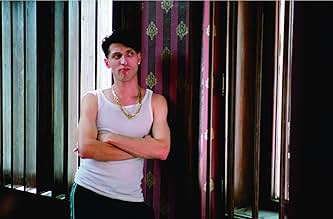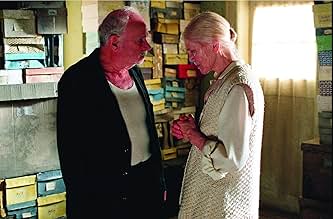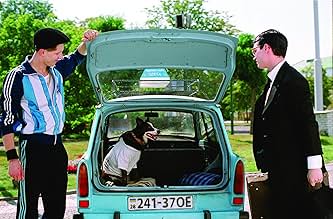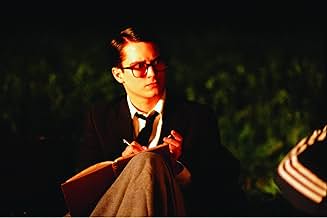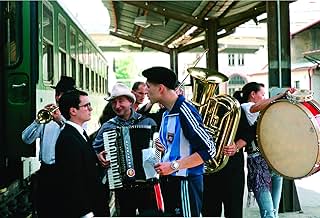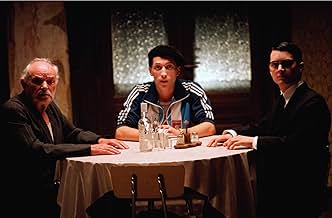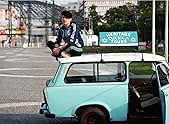A young Jewish American man, with the help of an eccentric local, endeavors to find the woman who saved his grandfather during World War II in a Ukrainian village that was ultimately razed b... Read allA young Jewish American man, with the help of an eccentric local, endeavors to find the woman who saved his grandfather during World War II in a Ukrainian village that was ultimately razed by the Nazis.A young Jewish American man, with the help of an eccentric local, endeavors to find the woman who saved his grandfather during World War II in a Ukrainian village that was ultimately razed by the Nazis.
- Director
- Writers
- Stars
- Awards
- 7 wins & 6 nominations total
- Grandfather
- (as Boris Leskin)
- Ukrainian Band Member
- (as Sergej Rjabcev)
- Ukrainian Band Member
- (as Jurij Lemeshev)
- Director
- Writers
- All cast & crew
- Production, box office & more at IMDbPro
Featured reviews
"Everything Is Illuminated" is a strange movie about a weird young man with the compulsive behavior of collecting souvenirs from his family to not forget them that seeks the past of his grandfather to understand how could be his life if his grandfather had not moved to USA. This bizarre vegetarian character meets a dysfunctional Ukrainian family that owns an amateurish travel agency specialized in helping Jews to find missing relatives, and together they have an almost surrealistic road-trip through the country of Ukraine. The movie begins like a comedy, with a sarcastic black humor, and ends in a touching and tragic drama recommended for specific audiences. My vote is seven.
Title (Brazil): "Uma Vida Iluminada" ("An Illuminated Life")
I would have given the movie a higher rank, but I feel that the translation from Russian/Ukrainian into English is not done too well. At times, that is clearly deliberate. At times, I could not find a better way to re-tell the situation as it has a slight Lost in Translation effect. At times, it was just poorly done. Thankfully, there are very few poorly done moments. At one point, the English translation is a direct opposite of what the actors actually said.
However, I feel that a significant amount of the humor comes from a deliberate mis-translation from Russian to English. While some viewers may feel that they are left out, there are situations which are difficult to convey in a few phrases that have yeas of history and culture behind them. You definitely get the most out of this movie if you understand Russian. You get even more if you understand the cultural differences between primarily Russian-speaking Odessa and primarily Ukrainian-speaking L'viv. Some anecdotes are simply incorrect, albeit funny.
Regardless of the 8, I still add this movie to my favorites. I feel that much of what is incorrect is left as-is for a reason, and overall, the movie does very well to convey life in Ukraine (the old and the new), the friendliness, though maybe rough up-front, of the people and the story itself. Well done.
There is indeed plenty of humor: eccentric, un-subtle, sometimes somewhat twisted humor: the kind of humor I generally find very appealing indeed. But most of the humor is the kind that appears conscious at all times of things deeply serious, deeply sensitive, even deeply painful. The movie weaves together themes of Past and Present, Perception and Truth, Memory and Activity, Life and Death. The entire movie is suffused by the history of European anti-Semiticism in general, and of the Holocaust in particular.
How can Humor and Horror be combined in the same movie? The review I saw suggested that the humor is Absurdist. I don't think this is the case at all; at least not in the common sense. Instead, I think this movie stands in the tradition of much Jewish / Yiddish literature and theatre. I don't claim to be any kind of expert in this area; but from what I've seen, Humor is used, in this cultural context, both as a coping tool for the horribly tragic experiences of this people; and also Humor is used as a means of "recovering the Divine" for men and women who choose a path of Faith rather than a path of either Despair or Absurdism. See "Fiddler on the Roof" for Humor used in both ways in this rich tradition.
Elijah Wood (Jonathon) Wood wears horn rimmed glasses that really make him look, well, strange: compare Sin City when he wore the same kinds of glasses with chilling effect. In this movie, it's easy to see how the glasses become a metaphor for both his Search and for his Struggle between Perception and Truth. Eugene Hutz (Young Alex) and Boris Lesking (Old Alex) are both really just wonderful. Jonathon and Young Alex are from the same generation, yet seem so very, very different; and then find that they are not so different after all. And the way in which the Apparent Narrative Voice changes gradually from that of Jonathon to that of Young Alex .. as a journey of intended discovery for Jonathon becomes one of discovery for both Young Alex and Old Alex ... is to me so very moving.
There are some wonderful scenes and panoramas from (I'm told) Prague and environs, standing in for the Ukraine of the story line. All feels very authentic and seems to give a wonderful sense of place; although I've never been myself to the Ukraine and can hardly testify to this from first hand experience.
All in all, if you're looking for light comedy, I would not recommend this movie at all. On the other hand, if you are interested in a wonderful, delightful, and deeply moving film, please, check out this wonderful movie.
Debut director/adapter Liev Schreiber retains some of the humor and language clashes of the novel, mostly through the marvelous Eugene Hutz as the U.S.-beguiled Ukrainian tour guide. He is so eye-catching that the film becomes more his odyssey into his country and his family as he goes from his comfortable milieu in sophisticated Odessa to the heart of a cynical, isolated land that has been ravaged by conquerors through the Communists and now capitalists, with both Jews and non-Jews as detritus. As funny as his opening scenes are when he establishes his cheeky bravura, we later feel his fish-out-of-waterness in his own country when he tries to ask directions of local yokels.
Shreiber uses Elijah Wood, as the American tourist, as an up tight cog in a visual panoply, as his character is less verbal than as one of the narrators in the book. He and Hutz play off each other well until the conclusion that becomes more sentimental in this streamlined plot. Once the grandfather's story takes over in the last quarter of the film, marvelously and unpredictably enacted by Boris Leskin, the younger generation does not seem to undergo any catharsis, as they just tidy up the closure.
Schreiber does a wonderful job visualizing the human urge to document history. One of his consultants in the credits is Professor Yaffa Eliach and her style of remembering pre-Holocaust shtetl life through artifacts clearly inspired the look and it is very powerful and effective.
The Czech Republic stands in for the Ukraine and the production design staff were able to find memorable symbols of change in the cities, towns and countryside, as this is now primarily a road movie, and the long driving scenes do drag a bit. Schreiber retains some of the symbolism from the book, particularly of the moon and river, but having cut out the portions of the book that explain those, they just look pretty or ominous for atmosphere and no longer represent time and fate.
As W.C. Fields would have predicted, the dog steals most of his scenes for easy laughs. In general, Schreiber does go for more poignancy than the book. It is irresistibly touching, especially for those who haven't read the book, but less morally and emotionally messy.
The film is enormously uplifted by its marvelous soundtrack, which ranges from songs and instrumentals from Hutz's gypsy band to traditional tunes to contemporary tracks to Paul Cantelon's klezmer fusion score.
This is not a Holocaust film per se, being a kind of mirror image of "The Train of Life (Train de vie)" as about memory of a time that is freighted with meaning now, but will resonate more with those who have an emotional connection to that history.
No spoilers here. The summary is, as IMDb describes, a young man's journey to the Ukraine to follow his roots and find the village where his father grew up.
The dialog is in English and Ukrainian (and Russian too, I believe). This allows for some wonderfully linguistically-based moments as one character interprets, more or less faithfully, for the English speaker in the group, depending on the circumstances.
The scenery is wonderful and the musical score is a treat with wonderful Eastern European influences. Be sure you stay through the credits for the final tune.
This is Lieve Schreiber's directorial debut and is well done. I give this film a 9, one of the best films I've seen in a long time. I recommend it highly.
Did you know
- TriviaEugene Hutz's band Gogol Bordello appears as the polka band that greets Elijah Wood at the train station.
- GoofsWhen the Grandfather repeatedly sounds the horn of the car, he presses the middle of the steering wheel to do so. In the Trabant, the horn is activated by pushing the signal light lever forward.
- Quotes
Alex: I have reflected many times upon our rigid search. It has shown me that everything is illuminated in the light of the past. It is always along the side of us, on the inside, looking out. Like you say, inside out. Jonathan, in this way, I will always be along the side of your life. And you will always be along the side of mine.
- Crazy creditsSeveral songs are credited to the New York punk/Gypsy/Jewish klezmer band, Gogol Bordello, which is led by Eugene Hutz, who plays Alex in the film (the same band greets Jonathan when he arrives on the train). The last of these songs, "Start Wearing Purple (For Me Now)," which plays over the end credits, is credited to both a correct spelling (Gogol Bordello), dg and Gogol Bodello, an incorrect spelling.
- ConnectionsFeatured in Today: Episode dated 24 November 2005 (2005)
- How long is Everything Is Illuminated?Powered by Alexa
- Who is the dedication to at the end of the movie? Alex 1993
Details
- Release date
- Country of origin
- Official site
- Languages
- Also known as
- Everything Is Illuminated
- Filming locations
- Production companies
- See more company credits at IMDbPro
Box office
- Budget
- $7,000,000 (estimated)
- Gross US & Canada
- $1,712,337
- Opening weekend US & Canada
- $66,806
- Sep 18, 2005
- Gross worldwide
- $3,601,974
- Runtime1 hour 46 minutes
- Color
- Sound mix
- Aspect ratio
- 1.85 : 1
Contribute to this page



